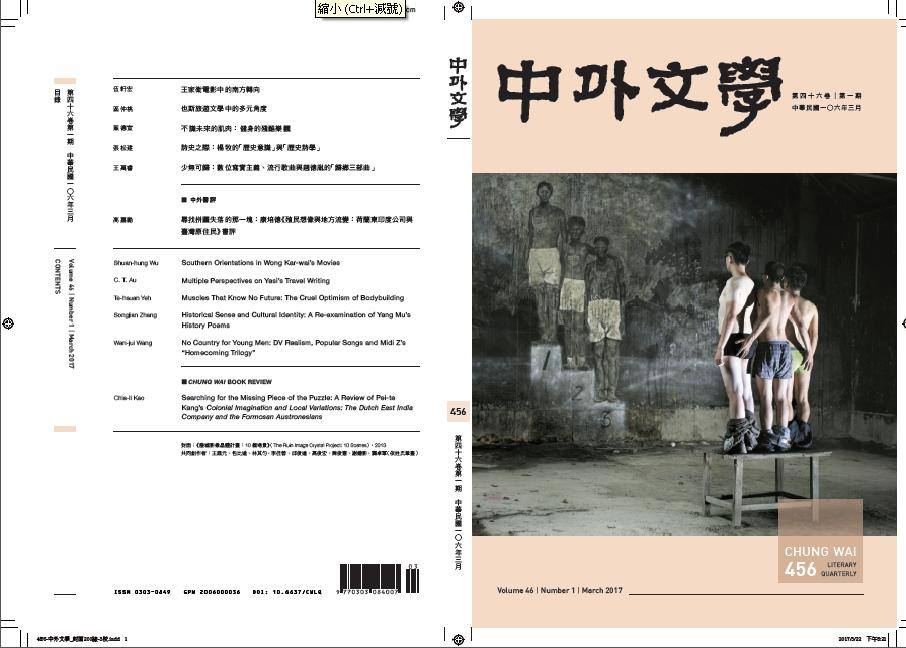第四十六卷 第一期 總456 中華民國106年3月
Vol.46 No.1 March 2017

《中外文學》三月號收錄了五篇精彩的學術論文,以及一篇學術書評。伍軒宏以王家衛電影中的「南方」指涉為著眼點,討論其電影如何以「南方轉向」作為敘事策略,透過方向的改變牽動故事、人物的轉向,以及意義的指向;區仲桃分析香港作家也斯三部跟旅遊相關的小說:《布拉格的明信片》、《記憶的城市‧虛構的城市》與《後殖民食物與愛情》,說明其旅遊文學呈現出跟現代旅遊文學及「反旅遊文學」不同的類型,從中凸顯香港文化的特色;葉德宣以酷兒理論家柏蘭特(Lauren Berlant)提出的殘酷樂觀論點與德勒茲(Gilles Deleuze)的情動觀,分別剖析健身文化中自虐訓練的殘酷及其「不識未來」、只有現下之惘惘然的情動,如何成就一種逸脫人道主義限制的(反)修復可能,並重新改寫樂觀與希望的時間性;張松建以楊牧的「歷史題材」現代詩為例,研討楊牧的「歷史意識」與「歷史詩學」之相關議題;王萬睿則指出導演趙德胤如何在以緬甸離散華人為主題的「歸鄉三部曲」——《歸來的人》、《窮人。榴蓮。麻藥。偷渡客》與《冰毒》——中建構寫實且多音複調的音景,反映緬甸年輕華人跨境打工的流離困境。學術書評部分,高嘉勵對康培德的著作《殖民想像與地方流變:荷蘭東印度公司與臺灣原住民》做出精彩評析,同時也點出文學與文化想像對於重構這一段許多台灣人都感陌生的歷史之重要性。
中外文學三月號目錄
Contents
伍軒宏╱王家衛電影中的南方轉向
王家衛電影中的南方轉向
伍軒宏*
摘要
本論文以王家衛電影中的「南方」符號或指涉為核心,討論他的十部長片如何以「南方轉向」作為敘事策略,透過方向的改變牽引故事、人物的轉向,以及意義的指向。在不同作品中,不同指涉「南方」的地點代表了不同的價值,施展不同的作用,王家衛因「片」制宜,建構不同的意義。本論文分五個部分,討論「南方轉向」:1.《阿飛正傳》等六部王家衛作品中,南方轉向的移位明顯,南方符號扮演重要轉折的樞紐,本文稱之為「南方支點」系列,並詳細分析此六部電影的轉向意義;2.《旺角卡門》等四部王家衛作品中的南方指涉比較隱晦,本文稱之為「南方隱喻」系列,並詮釋它們的暗示;3. 本文第三部分運用有限篇幅耙梳文學與文化理論中的「南方論述」,並將之與王家衛電影的南方傾向,做出連結,希望透過比較與對照,幫助理解電影中的「南方轉向」;4. 第四部分說明「轉向的意義,意義的轉向」;5. 最後,以討論王家衛「再度南方」的策略作為結語。
◎關鍵詞:王家衛,南方,南方論述,香港電影,華語電影
★獨立學者,曾在《中外文學》發表〈不可(不)宣布不獨立:以別名之名〉等論文,短篇小說〈前言〉、〈緣始物語〉,散文〈魔鬼代言人:紀念顏元叔老師〉。
Shuan-hung Wu╱Southern Orientations in Wong Kar-wai’s Movies
Southern Orientations in Wong Kar-wai’s Movies
Shuan-hung Wu*
Abstract
This article aims to investigate the strategy of “southern orientations” deployed in Wong Kar-wai’s feature films, up to The Grandmaster of 2013. Generally a “turn” to the south, in the form of displacement to a southern location in cinematic spatial arrangements, is invoked when Wong’s movie needs a resolution to the dilemma posed to his protagonists. For the purpose of analysis, Wong’s movies are divided into two groups in terms of the question of the south: those in which the turn to the south or southern orientation is prominent and plays a crucial role in the trajectory of the story, as in Days of Being Wild and 5 others, and those in which the turn to the south is less outstanding or even negligible, as in Chungking Express and 3 others. In the first group, the turn to the south serves as a pivot, while in the second group, it works metaphorically and tangentially. The article proceeds to explore the different significance, values, and effects of different “southern orientations” in Wong Kar-wai’s movies in the context of a general discussion of the meaning of the south as well as the strategy of the “turn,” in relation to the particular deployment in each of his movies.
◎Keywords: Wong Kar-wai, the South, Hong Kong cinema, Chinese-Language cinema
★Independent researcher and writer, taught at National Chengchi University for many years and published “Independence In-declared: In the Name of Aliases” in Chung Wai Literary Monthly, among other papers and short stories.
區仲桃╱也斯旅遊文學中的多元角度
也斯旅遊文學中的多元角度
區仲桃*
摘要
◎關鍵詞:也斯(梁秉鈞),旅遊文學,香港文學,多元角度,殖民/後殖民主義
★香港教育大學文學及文化學系助理教授。
C. T. Au╱Multiple Perspectives on Yasi’s Travel Writing
Multiple Perspectives on Yasi’s Travel Writing
C. T. Au*
Abstract
◎Keywords: Yasi (Leung Ping-kwan), travel writing, Hong Kong literature, multiple perspectives, colonialism/postcolonialism
★Assistant Professor, Department of Literature and Cultural Studies, The Education University of Hong Kong.
葉德宣╱不識未來的肌肉:健身的殘酷樂觀
不識未來的肌肉
健身的殘酷樂觀
葉德宣*
摘要
過往學術界對於健身文化之考察,往往受到女性主義單一性別閱讀框架範限,將參與此實踐者視為陽物中心主義的共謀者,「霸權男性特質」成為一種過度氾濫使用之標籤,用以評判肌肉鍛鍊者具有自厭自毀意味之自體崇拜,而自毀與自戀之中蘊含之情感基底,則往往受到漠視。本文擬透過晚近酷兒理論家柏蘭特提出之殘酷樂觀論點與德勒茲的情動觀,分別剖析健身文化中自虐訓練的殘酷與惘惘然只有現下沒有明日的情動,如何成就一種逸脫人道主義限制的(反)修復可能,同時亦重新改寫樂觀與希望的時間性,使得健身的情感/情動面不再綁死在對於達致完美體態的美好未來想像,而可以是對於肉身鍛鍊所佔據的每個現今的分分秒秒的懵懂執著;因此,快樂可不再依附於任何存在於未來的明確客體與標的,而僅僅是每次自虐地將自身肉體摧折至酸痛不能自已而萌生的惘惘滿足。
◎關鍵詞:健身,殘酷樂觀,情動,自戀,自毀,時間性
★國立中央大學英美語文學系助理教授。
Te-hsuan Yeh╱Muscles That Know No Future: The Cruel Optimism of Bodybuilding
Muscles That Know No Future
The Cruel Optimism of Bodybuilding
Te-hsuan Yeh*
Abstract
Constricted by a unilateral feminist framework which deploys only gender as its axis of analysis, past critical literatures on bodybuilding often construe the subculture’s participants as implicated in phallocentrism. “Hegemonic masculinity” has since become an overused label to criticize bodybuilders’ narcissistic investment in the worship of their own flesh, which is frequently accompanied by a self-debasing, masochistic overtone. The affective implications of the above masochism and narcissism, meanwhile, have been largely overlooked. Drawing upon Lauren Berlant’s notion of “cruel optimism” and Gilles Deleuze’s concept of affect, the present paper will address the cruelty and optimism of bodybuilding respectively. I will examine how its masochistic mode of training and inchoate affect unbound from the future onto the present may constitute an (anti-)reparative possibility that falls outside the limited purview of humanism while rewriting the temporality of optimism and hope. This particular affective aspect of bodybuilding is no longer confined to an imagination of a future in which one finally reaches a stage of bodily perfection; rather, it could be an indescribable fixation upon the present moment in which the training takes place. Thus understood, happiness can be seen not as something that attaches itself to the future, but as an unnamable contentment brought about by the masochistic physical exertion that tortures the body to the point of pain and fatigue.
◎Keywords: bodybuilding, cruel optimism, affect, narcissism, masochism, temporality
★Assistant Professor, Department of English, National Central University.
張松建╱詩史之際:楊牧的「歷史意識」與「歷史詩學」
詩史之際
楊牧的「歷史意識」與「歷史詩學」
張松建*
摘要
本文旨在深入研討楊牧的「歷史意識」與「歷史詩學」。從1968 到2011 年,楊牧寫了二十二首左右的「歷史題材」現代詩,其中包括:〈續韓愈七言古詩山石〉、〈武宿夜組曲〉、〈延陵季子掛劍〉、〈秋祭杜甫〉、〈鄭玄寤夢〉、〈吳鳳成仁〉、〈熱蘭遮城〉、〈甯靖王歎息羈樓〉、〈歲末觀但丁〉。本文首先論證楊牧的「歷史意識」源於其跨國離散和知識冒險導致的個人觀念的再解放,認為這種歷史意識的哲學基礎是詹明信所謂的「存在歷史主義」,它與現代西方歷史哲學有所呼應和共鳴。本文進而研討楊牧的「歷史詩學」如何採納幾種闡釋模式以傳達「歷史意識」與「文化認同」,認為他的歷史想像之重點不在發思古之幽情,而在投射抒情自我於當下處境中的戲劇性體驗。本文也指出,楊牧的歷史詩學見證了後殖民全球化背景下,本土意識的蓬勃與文化認同的轉向。
◎關鍵詞:楊牧,歷史意識,歷史詩學,存在歷史主義,文化認同
★新加坡南洋理工大學中文系助理教授。
Songjian Zhang╱Historical Sense and Cultural Identity: A Re-examination of Yang Mu’s History Poems
Historical Sense and Cultural Identity
A Re-examination of Yang Mu’s History Poems
Songjian Zhang*
Abstract
◎Keywords: Yang Mu, historical sense, poetics of history, existential historicism, cultural identity
★Assistant Professor, Division of Chinese, Nanyang Technological University, Singapore.
王萬睿╱少無可歸:數位寫實主義、流行歌曲與趙德胤的「歸鄉三部曲」 王萬睿*
少無可歸
數位寫實主義、流行歌曲與趙德胤的「歸鄉三部曲」
王萬睿*
摘要
◎關鍵詞:數位寫實主義,歸鄉三部曲,趙德胤,音景,離散攝製
★ 國立中正大學台灣文學與創意應用研究所兼任助理教授。
Wan-jui Wang╱No Country for Young Men: DV Realism, Popular Songs and Midi Z’s “Homecoming Trilogy”
No Country for Young Men
DV Realism, Popular Songs and Midi Z’s “Homecoming Trilogy”
Wan-jui Wang*
Abstract
◎Keywords: DV Realism, Homecoming Trilogy, Midi Z, soundscape, diasporic filmmaking
★Adjunct Assistant Professor, Graduate Institute of Taiwanese Literature and Creative Innovation, National Chung Cheng University.
中外書評
Chung Wai Book Review
- 高嘉勵╱尋找拼圖失落的那一塊:康培德《殖民想像與地方流變:荷蘭東印度公司與臺灣原住民》書評
Chia-li Kao╱Searching for the Missing Piece of the Puzzle: A Review of Pei-te Kang’s Colonial Imagination and Local Variations: The Dutch East India Company and the Formosan Austronesians
